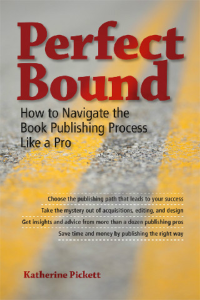
Today’s guest post is excerpted from Perfect Bound: How to Navigate the Book Publishing Process Like a Pro by Katherine Pickett (@KPickett_Editor).
What Is a Developmental Editor?
Developmental editors (DEs) are concerned with the structure and content of your book. If your manuscript lacks focus, your DE will help you find the right direction—the “right” direction generally being the most marketable.
Development editing is also where problems of inconsistent tone or an unclear audience often surface. Developmental editors perform many of the same editing tasks as an acquisitions editor, but unlike AEs, whose time is split between editing and the business side of publishing, DEs can often give you more personal attention.
When working with a DE, be prepared to be challenged; while a DE won’t generally dictate to you what the book has to be, you may be asked to justify your position when there is disagreement. At all times, however, it should be a collaboration. In his essay “Developmental Editing” Paul D. McCarthy writes:
“Successful collaboration allows the author to feel sustained and liberated by knowing that she doesn’t have to bear the burden of creation, development, and refinement alone.”
While it can be a relief to lean on another’s expertise, this so-called liberation by your DE can feel more like an attack. It helps to remember that you and your editor have the same goal: to make the best book possible. When you consider your DE a part of your publishing team, you’ll be better able to accept his or her critique.
How to Work With a Developmental Editor
- Be open-minded and seriously consider the feedback you receive. Manuscript development can be uncomfortable. The effort you have put into your writing, the time you took to craft the manuscript the best you could—it is difficult to set those aside and let an outsider take apart and piece back together your work.
- Flexibility and good communication are a must. To help smooth the process, discuss your vision of the book with your DE and work together until you can agree on a plan of action. It is essential that you and your DE have common goals and vision for the book for development to succeed. “If the author does not embrace the plan with enthusiasm,” explains Scott Norton in his book Developmental Editing, “there’s no sense in attempting development.” Should you have real reservations about the direction the DE is leading you and you feel your vision for the project is in danger, talk to your acquisitions editor, if applicable. If the DE is someone you hired, you may wish to find a new DE.
- Remain focused on the big picture. Once you both agree on the direction your book should take, the DE will help you determine the best order and organization for the chapters, highlight places where the text may have digressed too far from the topic, and point out areas where more explanation is needed. If you are writing nonfiction, the chapter titles, headings, and subheads in the book may need to be rejuvenated, reworked, or eliminated. Artwork, sidebars, and any other special elements may also need to be created or placed throughout the manuscript. With fiction, common errors that DEs deal with include plot points that don’t lead anywhere, inconsistent characterization, or missed opportunities to bring out your main themes. Throughout the process, the DE will help ensure that your intended audience is clear and that you have maintained a consistent tone in your writing. In this type of manuscript development. you are piecing together the big picture rather than focusing on grammar, word choice, and punctuation. Those surface corrections will be made later in the process.
What Your Developmental Editor Expects from You
- Trust and respect. DEs can improve your manuscript in a way that you can’t on your own, and much of this comes from not being emotionally tied to the writing as you are. When they see your manuscript for the first time, they can spot the rough areas more easily than you can. Experienced DEs are good problem solvers and often can fix common problems very easily. If you’re working with a traditional publisher, you may need to work with a DE when you didn’t think one was necessary, which means putting your trust in the acquisitions editor who has sent you down that path.
- Timeliness. Your DE will work hard to meet the agreed-upon deadline for sending you the edited manuscript, and you should work similarly hard to return the reviewed manuscript by the due date you’ve agreed to. Meeting this deadline is important because your DE has other authors to accommodate as well. If you miss your deadline, your DE may need to put your book at the back of the pile when you do return the manuscript. For some authors, scheduling is flexible, but if you are trying to meet a certain publication date and you miss your deadlines, you cannot expect your DE to make up the time. So be realistic about your ability to finish the manuscript review, and communicate with your editor if you need more time.
When the DE and the author agree on a vision for a new project, development can be a thrilling experience. For me as a DE, I love seeing a manuscript transform from one with gaps and excesses into something whole and compelling. Helping an author to achieve the vision he or she had for the book is extremely rewarding. With both an engaged author and editor, editing suggestions are assessed, adapted, and implemented in the author’s own voice and style, and the final manuscript is a point of pride for both.
Note from Jane: If you enjoyed this post, check out Katherine Pickett’s Perfect Bound: How to Navigate the Book Publishing Process Like a Pro.
Katherine Pickett has been involved in the publishing industry for 15 years. She spent 5 years as a production editor with McGraw-Hill Trade in Chicago before moving on to the medical textbook publisher Elsevier Inc. in St. Louis.
In 2006, Katherine left Elsevier to start her own company, POP Editorial Services, and is now a full-time freelance copyeditor, proofreader, and developmental editor. A strong believer in the collaborative approach to editing, Katherine adapts her style to fit the needs of her clients.
She is an active member of the Editorial Freelancers Association and the St. Louis Publishers Association and is president of the Maryland Writers Association, Montgomery County chapter. She lives in Silver Spring, Maryland.


Glad to see this post, Jane! For years I’ve “critiqued” poetry, but the term has negative connotations as people often see it as “criticism.” Besides, who wants to say “I’m a criticer” much less a “critic,” even if that means a literary one.
Then recently on one of the social sites, someone asked if anyone knows of a poetry developmental editor, and I thought, “Yea! That says it well.” Thanks.
[…] Monday (9/8): Excerpt from Chapter 3 of Perfect Bound, “Looking at the Big Picture: Manuscript Development,” published by Jane Friedman […]
[…] Monday (9/8): Excerpt from Chapter 3 of Perfect Bound, “Looking at the Big Picture: Manuscript Development,” published by Jane Friedman […]
This had a lot of info I didn’t know. Considering how hard it is to get accepted to a house, it’s difficult to understand why they’d accept something that’s big picture is so messed up that it would need a DE. Great post – I appreciate the info!
For traditionally published nonfiction books, they are usually acquired based on a proposal, not a manuscript. Once the author signs the contract, they begin writing, then submit their work to a developmental editor. (There’s often a deadline for the first half of the manuscript, then a deadline for the full.)
Ah. That makes a lot of sense. I was thinking fiction manuscripts. Thanks for clarifying!
Quite informative. Thank you for posting this. Now I can point someone to this article when they need a clear explanation of what developmental editors do.
[…] 3. What Is a Developmental Editor and What Can You Expect? […]
I needed two developmental editors I had so much material. They were both brilliant. Arlinda Shtuni (shtuni@yahoo.com) helped me focus the big picture and create a clear train of thought for my non-fiction book on the transformational power of human touch. Jennifer Read Hawthorne (jhawthorne21@yahoo.com) polished it like a gem until every word sparkled. Took 18 months and $3000. Worth every penny!
[…] What Is a Developmental Editor? What Can You Expect? […]
[…] https://janefriedman.com/2014/09/08/developmental-editor/ […]
[…] but it is necessary. Jami Gold discusses finding problems vs. fixing problems, Marcy Kennedy shares a simple grammar trick that will clean up your fiction, and Katherine Pickett describes what to expect from a developmental […]